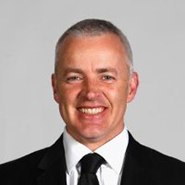On any day, one small event can influence the course of a life.
Pete Gallagher, now the sports physiotherapist with New Zealand's All Blacks, injured his hand as a teenager. A physio's work to restore that hand to full function kindled his curiosity.
 An early interest in human anatomy was set aside however, while Pete focused for a time on competitive rowing.
An early interest in human anatomy was set aside however, while Pete focused for a time on competitive rowing.
Rowing coach at Dunedin's St Pauls' High, Brian O'Kane, recalls Gallagher as a bright student with a strong support network.
Coach Brian feels that the rowing squad in the '80's wore the tag of 'underdog' with some pride. That self-perception may have allowed the boys to succeed beyond expectations.
Pete loved the early morning training sessions and his very focused role as coxswain for the squad.
Otago days
It took a couple of years of business studies at Otago for Pete to discover that he would not become an accountant.
He would find the strong team culture at physiotherapy more agreeable, and teachers Grace Wilson, Margot Skinner and Judy Wilson helped guide and mentor Pete's transition from the world of business to the art of physiotherapy.
Being a smaller city, Dunedin soon proved ideal for easy rest and recreation. The annual student ritual of St Patrick's Day celebrations stands out in Pete's memories.
With his mind set on a career in sports physiotherapy, Pete dedicated a lot of his time after graduation to honing his craft.
Soon after this, All Black legend Mark Mayerhofler asked for Pete's expertise to help deal with a persistent hamstring injury. Mayerhofler enjoyed a successful international career in both union and league as a relentless competitor. This injury demanded Pete's constant monitoring and treatment.
All Black Dan Carter's return to Rugby World Cup form in 2009 was in large part due to Pete's skills in respiratory, neurological, and musculoskeletal rehabilitation. Carter had suffered a severe Achilles injury and partial rupture while playing for French club Perpignan. Without expert care, this injury would almost certainly have ended his stellar career as a first-five eighth.
Technology in high-performance sport
It's a gadget supermarket out there, in Pete's opinion, with new and revolutionary devices arriving almost every week. Yet many of these are later found gathering dust in a dark corner of the gym.There is no substitute for the human factor when it comes to getting players back into the game sooner. What may be an effective therapy for one athlete can well prove sub-optimal with another.
Pete believes that effective physiotherapy should always follow holistic principles, and consider the obvious synergies of body and mind.
Efforts in rehabilitation must also embrace appropriate science such as imaging, to ensure accurate diagnosis before, during and after treatment.
Exercise prescriptions for educated humans
In the professional era, the demands put on athletes to perform are greater than in the past and there are times when a determined player tries to push through the pain barrier.
Good communication is critical, so that injuries challenging an athlete can be identified and a regime of targeted treatments put in place.
The human body needs time to rebuild and adapt neural pathways after injury or trauma. This rebuilding can take 18 months to 2 years after major injury and keen oversight is essential if agreed performance targets are to be met.
Any athlete will perform better when a clear programme is set up to encourage incremental improvement in well-being. There must always be a structure to support that individual plan.
Sports physios and their charges are then able to move from one 'checkpoint' to the next in the search for a smooth comeback to training or to the field.
A great physiotherapist will be efficient at finding and targeting problems. Pete Gallagher's experience at the top level of international sport has taught him that the solutions can be as diverse as the patients.
Pete Gallagher has a Diploma in Physiotherapy (Otago); a Post Graduate Certificate in Physiotherapy(Acupuncture); and a Masters in Health Science (Otago)
Read more about Pete Gallagher and his career as sports physiotherapist with the All Blacks.
Find out about post graduate study in sports physiotherapy at Otago.
